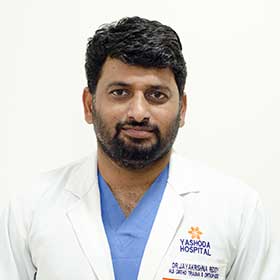Best Ankle Surgery Doctors
Select Preferred Location :

Dr. Sunil Dachepalli
MS (Ortho), MCh (Ortho), MSc (Trauma & Ortho-UK), MRCS (Edinburgh), FRCS (Trauma & Ortho), Fellowship in Shoulder Surgeries (UK) & Computer Assisted Joint Replacements (London)
26 Years Of ExperienceSr. Consultant in Sports Medicine, Trauma, Arthroscopy, Robotic Joint Replacement Surgeon
Clinical Director
5 awards
FAQ’S
What kind of doctor does ankle surgery?
Podiatrists and orthopedic surgeons are qualified to treat conditions of the foot and ankle surgically and non-surgically. In general, the best option is to choose the doctor who you feel most comfortable with or who is experienced in treating a particular condition.
Orthopedics is a medical specialty dedicated to the diagnosis, treatment, rehabilitation and prevention of injuries and diseases of the musculoskeletal system. These surgeons complete an additional training for advanced foot and ankle reconstruction after their post graduation.
Some common conditions that foot and ankle orthopedic surgeons treat include:
- Achilles tendonitis and tendinosis
- Osteoarthritis
- Lisfranc injury
- Ligament tears
- Broken bones, stress fractures and sprains
- Plantar fibroma and fibromatosis
- Metatarsalgia foot pain
- Plantar Fasciitis
Podiatrists not only take care of the bones, soft tissues and joints of the foot and ankle, but also skin conditions and abnormal mechanics of the lower limbs.
Conditions that podiatrists usually treat are:
- Arthritis
- Ingrown toenails
- Calluses
- Chronic injuries associated with diabetes or other illnesses.
- Foot deformities such as bunions, hammertoes
- Fallen arches
- Heel pain
- Bone spurs
- Neuromas
- Plantar fasciitis
How long will it take to recover from ankle surgery?
Depending on the complexity of the surgery, patient’s age and general health, and adherence to instructions such as loading position, rest, height, the recovery time after foot/ankle surgery can vary. For most foot and ankle operations, the tenderness and swelling can take 3 to 4 months to go away, but for more complex procedures, it can take a complete year or even more to heal.
After the operation:
- Avoid travelling or driving alone.
- Follow the instructions for the surgery given by your surgeon.
- Plan to rest for the first two weeks after surgery.
- Keep the cast or bandage dry and don’t change it until it is recommended.
- Take pain relievers as prescribed.
- Do not smoke.
- Pain relievers can cause constipation, so a high-fiber diet can help. Plenty of protein, fruits, and vegetables provide the best nutrients for healing.
- If there are any warning signs of illness, it is advised to contact your healthcare team immediately.
Warning signs:
See a doctor if you experience any of the following warning signs:
- Severe foot pain that is not relieved.
- Fever greater than 38.5°C
- Tenderness of the lymph nodes in the groin.
- Severe calf pain, shortness of breath, or chest pain.
- Adverse reactions caused by prescribed medications.
What are the different types of ankle surgery?
The type of surgery to treat the condition of the ankle depends on the damage and certain health factors. Some of the ankle surgery treatment includes:
Ankle Arthroscopy: Loose bone fragments, damaged cartilage, and torn tendons can be treated with arthroscopy. In this minimally invasive procedure, the doctor will make a small incision to insert a narrow tube with a fiber optic video called an arthroscope. The interior of the joint can be observed on a video monitor. This will allow the surgeon to examine the joint and guide the tube to the next step without making large incisions.
Additional incisions can be made in different places near the affected ankle. Then the doctor will use special surgical instruments to treat and repair the joints. Due to the small and precise incisions in arthroscopic surgery, the patient feels less postoperative pain and recovers faster than conventional open surgery.
Ankle Fracture Repair Surgery: If you have broken bones in the ankle joint, the doctor may relieve the pain and repair the bone with surgery. This can include restoring broken bone fragments and using metal plates and screws to hold the bone fragments together to foster proper healing.
Ankle Replacement: During ankle replacement surgery, the doctor will remove damaged ends of the ankle bones and replace them with a prosthetic ankle. Candidates for ankle replacement are individuals with advanced arthritis. The patient is advised to avoid high-impact activities to prevent the damage to the artificial joint.
Ankle Fusion: During an ankle fusion, the surgeon removes damaged tissue and permanently fixes the ankle bones with screws and metal plates. When damaged bones heal naturally, they merge into one bone. Unlike ankle repositioning, it is generally recommended for younger patients with a more active lifestyle. One problem with this approach is the range of motion of the ankle. This generates additional pressure on neighboring joints, increasing the risk of arthritis in those joints.
Lateral Ankle Ligament Reconstruction: It is also known as the Brostrom procedure. This helps stabilize and strengthen the ankle, especially after recurrent ankle sprains. During this procedure, the doctor will tighten any loose or weak ligaments.
Is ankle surgery necessary?
If an individual has severe sprain, surgery may be needed to reattach the tendon to the bone. The surgeon may use stitches or sutures to reattach the tendon, or may use other ligaments or tendons of the ankle to repair damaged ligaments.
If a person experiences a fracture that keeps the ankle unstable, the bone fragments should be repositioned to their normal position and secured with screws or plates attached to the outer part of the bone.
Dealing with ankle pain can seriously affect daily life, so it is always a good idea to see a doctor at the first sign of injury. If non-surgical methods are not effective, surgery can help get you back to normal.
Do I need physical therapy after ankle surgery?
Physiotherapy helps in maintaining the body in the right position to function properly. It is used in the treatment of pain and orthopedic conditions through exercise, massage, and other therapies. When your ankle is healed, you need to rehabilitate it so that it is in motion again.
















